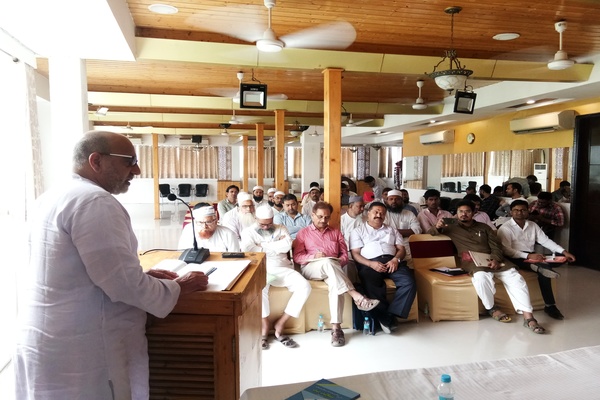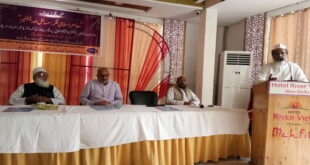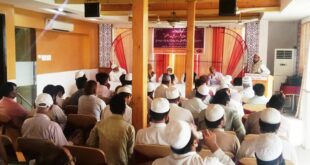
Imam Mohammad Qasim Nanautawi Research Centre, Old Boys’ Association of Darul Uloom Deoband and Institute of Religious and Social Thought (IRST) held the 8th Academic Talk on “Contemporary Islamic Thought: Issues and Challenges” on Saturday, 27 July, 2019 at Hotel River View, Jamia Nagar, New Delhi. Prof Ebrahim Moosa, Professor of Islamic Studies at the University of Notre Dame, Indiana, USA delivered the talk. He was in India for a week to participate in the Madrasa Discourses program of the Contending Modernities Initiative of the University of Notre Dame.
Prof Moosa began the talk with a Qur’anic verse implying to convey one’s message with the best way, referring once again to the Holy Book, to draw the point that the best way comes through patience and listening to others viewpoints. He then spoke in some detail about four points: governance, gender, ethics and role of ulama. He said, “When it comes to governance, a lot of issues and problems arise in different countries” and, how the Muslim youth could work with a secular government becomes a major concern there. Those of our students who join secular universities have dilemmas and apprehensions about their education. This is the reason why they do not excel in most cases, he said adding that the situation with the government was similar.
Citing a case study of South Africa, Prof Moosa said that three things are important: equality, justice and non-discrimination. He said that it was discussed with some of the top leaders of South Africa few decades ago that Muslims should be exempted of certain constitutional obligations. Elaborating on that he said, “What we fail to have is the right talent to think in such situations.” We think that we are superior. This is also found in our fiqh [jurisprudence or Islamic law-making process]. But, “there is a difference between the right of modern age and that of old age”. We make the mistake of forgetting history in our reading. The meaning of haq (translated as right in Arabic) is obligation which entails reciprocity, rights with deliverance of duties, but we are not working on that.
The modern idea is that “even if a man does not do anything he has certain rights” in the form of demands. Thus “human right defines rights in the context of demands”. Similar is the case in gender issues. Ethics are of two kinds: philosophical ethics and ethics found among the sufis to which we have not paid much attention. Sufis like Ibn Arabi [1165-1240] have given great space to human psychology in dealing with issues. Allama Muhibbullah Bihari [d.1708] did the same. However, we did not pay much attention to it. Discussing the role of ulama and how they can deliver their academic and spiritual duties, Prof Moosa said that first we should understand the shift from Aristotelian worldview to the modern worldview and note that “even the concept of human being has undergone change” but, unfortunately, such debates are not included in our madrasa syllabus. It should also be understood that “changes have taken place not just in the concept of cosmos but also of human”.


Speaking earlier on this occasion, Dr Qazi Zainus Sajideen Qasmi, former Head of Department of Sunni Theology, Aligarh Muslim University and General Secretary of the Old Boys’ Association said, “Muslims are not in India as subjects but as partners” in which case it is very important for them to think how to face the challenges in the country. Against this backdrop “what Professor Ebrahim Moosa is doing through his Madrasa Discourses project can help greatly” and therefore, he deserves our thanks and appreciation. He further said that there is no denying the fact that the academic and research work that should be done are not being done in our madrasas. It is unfortunate that this is not being done even in our major madrasas whereas “there is need for research of higher scale in madrasas”. He emphasised that the studies of sociology and psychology which are carried out in universities should be introduced in madrasas. We discuss more what a particular imam [leader of a particular school of thought] says and in that we forget what Islam says. He said that there should be focus on moral education also in madrasas. As it is difficult for us to move ahead without our madrasas, it is therefore necessary for our elders to think about these issues.
Former secretary of Jamaat-e-Islami Hind and Member, Executive Council of the Old Boys’ Association Maulana Mohammad Rafiq Qasmi said that Muslims should shun any movement which demands change in religion. He continued that we should treat our countrymen with wisdom and courage and avoid passing any comment on their faith and creed. “Instead of raising fingers at them we should highlight the beauties of Islam”, he said. Maulana Abdul Hameed Nomani took exceptions to some ulama who consider themselves as Amirul Mumineen stating that such attitude compounds problems at times.
The talk had begun with recitation of the Qur’an by Maulana Qari Mohammad Sulaiman Qasmi, imam [prayer leader] of Jama Masjid, Jamia Millia Islamia. It was followed by introductory words of Maulana Muhammad Muzzammil-ul-Haq Al-Husaini. Dr Waris Mazhari, Assistant Professor at Jamia Hamdard and founding director of IRST, presented a bio-sketch of Prof Ebrahim Moosa and coordinated the programme attended by ulama, students, university scholars and media persons who also asked questions and added comments.
 IRST Institute of Religious & Social Thoughts
IRST Institute of Religious & Social Thoughts